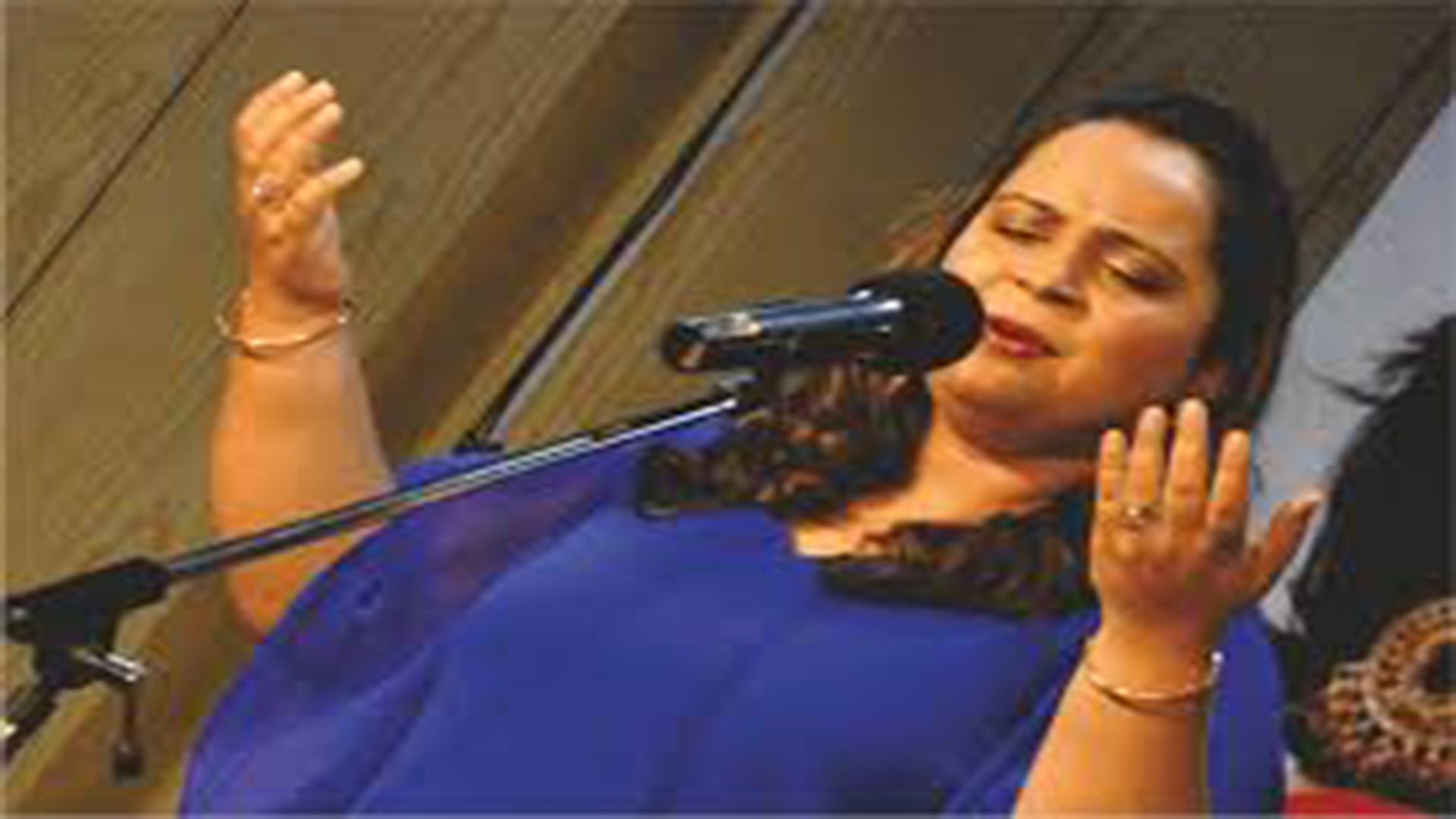Sonia - The Fado's New Fate
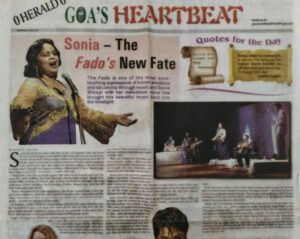
Sonia Shirsat is the Fado’s Lady Fate in Goa. On Valentine’s Day she swore her love for Portugal’s iconic melody. That the song has come to stay became obvious from the near-full Dinanath Mangueshkar auditorium that lapped up every bit of Mundo Fado II, Sonia’s first solo show on home turf.
Sonia’s voice is extremely well suited to the fado. Her talent first became evident at the ‘Vem Cantar’ contest (2002), through her superb rendering of Madre Deus’ ‘O Pastor’. Before long, ‘Barco Negro’’ sung by her also became a people’s favourite. And this time, a bright new ship – ‘M. V. Mundo Fado’, if you like! – dropped anchor in Panjim, from where it will again sail the Seven Seas.
Impressive is the line-up of fado greats that Sonia has performed with over the years. But more fulfilling must have been her own first solo concert, Mundo Fado, held in 2008, at Museu do Oriente, close to Alcântara docks, by the Tagus. She sang to a packed house, with guest artistes including Mestre António Chaínho, Manuel Leão, and Casa de Goa’s musical troupe, Ekvat!
Notice the poetry of that fabulous setting: the Orient, harking back to Goa; the proverbial waterfront, where the Fado originated amidst a sailor community; and the Tagus, from where all those intrepid ships once sailed “o’er seas hitherto not navigated… to seek out new parts of the world”….
So it was at Alcântara (‘the bridge’, in Arabic) that Sonia crafted her musical bridge with the fado world. Climbing onto the international stage is no mean task, especially for one not fully born into the genre. Sonia chose to cultivate it, chaperoned by her Lusophile mother Maria Alice Pinho, who belongs to a Goan generation raised on Portuguese music.
Mundo Fado II started off with an evocative instrumental medley by Sonia’s main accompanists, Flávio Teixeira Cardoso (Portuguese Guitar) and Pedro Miguel Soares Marreiros (Spanish Guitar) from Portugal. While they were at it, in walked Sonia draped in a designer gown and shawl. The backdrop was a quiet, understated, white with colour focus lights. Her first song was ‘Cansaço’ (‘Weariness’)… but needless to say both audience and artiste were zestful until the end!
There was a happy mix of familiar and not-so-familiar numbers. ‘Alfama’ (a tribute to Hotel Cidade de Goa’s restaurant of the same name where she is the lead artiste at the monthly ‘Noite de Fado’) was followed by ‘Amor de Mel’, Fado das Horas’, ‘Tive um Coração’, ‘Meu Amor Marinheiro’ and ‘Zanguei-me com o meu Amor’, among others.
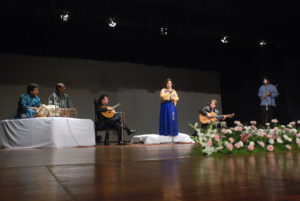
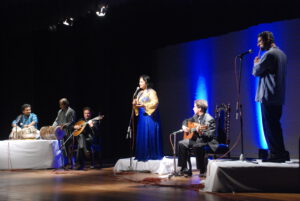
Sonia’s show was marked by measured stylistic innovation. It featured the tabla (Mayuresh Dattaram Vasta), the flute (Marwino António da Costa) and the dhol (Santosh Sawant). And in a style all her own, the vocalist had none of that over-the-top emotionality of the Portuguese fadistas, nor did the tempo quicken as the show progressed; but she sang with passion, offering personal and historical snippets in her announcements.
Sonia infused the fado with new blood, giving the genre a fresh lease of life, and perhaps scope for another to emerge (in a Goan tradition of give and take, which people of good will must endorse). ‘Rua do Capelão’, a ‘modern fado Severa’, with flute and guitars, was a tribute to Maria Severa, 19th century Portugal’s best-known fadista. The popular ‘Cartas de Amor’ was backed by flute, tabla and Spanish guitar; and ‘Ave Maria Fadista’ by tabla and the guitars. It was most fascinating to see the Indian instrumentalists gel with their Portuguese counterparts in ‘Barco Negro’. The latter also took to ‘Doreachea Lharari’ and ‘Adeus Korcho Vellu Pavlo’ as fish to water.
Sonia hailed the mandó as ‘Goa’s fado’! And curiously, hiding behind the Konkani title of our best-known farewell song were Portuguese lyrics – the labour of love of a suave Goa enthusiast Manuel Bobone. The ensuing musical dialogue symbolised a confluence of the past and the future; and its melody is an apt signature tune for Sonia’s Luso-Goan musical experiment.
Mundo Fado II unwittingly commemorated the centenary of the modern fado, first recorded in 1910. And, putting behind its nearly five-decade long hiatus in Goa, Sonia gave a clarion call to young fado singers Danika da Silva Pereira, Manuela Lobo and Efigénia de Santana Miranda to rise to the occasion. She also expressed her camaraderie by inviting guest artistes Carlos Manuel Meneses and Allan Abreu (both Spanish Guitar), Daryl Coelho (Mandolin) and Franz Schubert Cotta (Portuguese Guitar) to be on stage with her. And early in the show, she recalled the musical moments shared with Orlando de Noronha and Dinesh K., both of whom couldn’t make it that day….
That’s ‘Team Sonia’ for you, poised to carve out a brilliant new fate for the Fado in Goa!
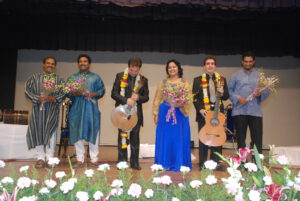
(Herald, Goa’s Heartbeat, 23 Mar 2011)
